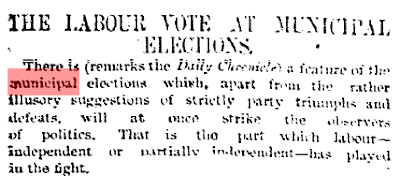It is the sort of headline the media delights to run, and will follow up with acres of “in depth investigation”, penetrating discussion, and of course soundbites from members of the public.
 |
| Solidarity, 1887 |
Back in 1894, the Manchester Guardian was less dramatic, more measured and a tad dismissive of the election of the first two Labour candidates to the city council.
They were John Edward Sutton and Jessie Butler, both worked in the coal industry, and both were members of the recently formed Independent Labour Party which had been established to campaign for the election of working class candidates at local and Parliamentary elections.
The Manchester Guardian was quick to point out both men were the outsiders.
Mr. Sutton who was standing in the Bradford Ward was up against a sitting councillor who had been elected unopposed since 1888, “when he defeated Liberals and independent candidates by a majority of considerably more than a thousand.”
In Openshaw which was the other Labour gain the seat had been won by the Liberals the previous year with a majority of over 700 votes.
 |
| Labour makes gains, 1894 |
But as ever the devil is in the detail, and the Bradford branch of the ILP had in the words of the Manchester Guardian “practically grown from nothing to its present strength in the course of the past three years”
Moreover, some of the working families in both wards would have owed their livelihood to the Bradford Colliery, and the year before the industry had faced a major national strike following the employer’s decision to cut coal miners wages by one quarter, while the Miner’s Federation demanded a “living wage” for the workforce.
 |
| ILP logo, 1893-1975 |
The industrial conflict grew bitter, troops were dispatched to some of the coalfields, and as tensions grew strikers at Featherstone in Yorkshire were fired on, with sixteen hit and two killed, while in Llanelly, in Wales “police armed with cutlasses” guarded the colliery after the cavalry had been withdrawn.**
The strike ran through the summer of 1893, and concluded in the November, and it appears to have played a major part in both Mr. Sutton and Mr. Butler becoming involved in politics. John Edward Sutton joined the ILP during the strike and by its end, was “has been one of the principle leaders at the Bradford branch of the Independent Labour Party”.
While for Mr. Butler who was an assistant to the secretary of the Miner’s Federation , it “was in part the action taken by the Labour Party on behalf of the miners which [led him] to become a member”.
 |
| The ILP arrives, Manchester, 1894 |
Both contests were hard fought with the Conservatives in the Openshaw ward distributing leaflets which branded the ILP as a vote for “Socialism and Anarchy”, but as the Manchester Guardian observed “It is improbable, however that the working class electors in the ward, who are perfectly familiar with Mr. Butler were in the slightest degree influenced by an appeal exhibiting such a limited amount of intelligence”.***
And in Bradford Ward, despite the Conservatives having “for some years occupied a strong position in this ward, holding all three seats ……. A large section of the working men, however, have expressed dissatisfaction with [the Tory candidate] and they gave effect to their feeling by nominating Mr. Sutton and working energetically in his behalf”.
 |
| ILP gain, Bradford, Manchester, 1894 |
A degree of confidence which saw them continue to elect him to the City Council for almost 20 years and followed that up with electing him as the MP in 1910, again in 1922 and from 1923 through to 1931.
But for many on that night of November 1894 the ILP’s entry on to the Manchester electoral scene was something to savour.
In total they got just over 10,000 votes spread out across the eleven wards they contested, and racked up some very decent three figure results, some of which like at Harpurhey brought them close to being the second party.
 |
| John Edward Sutton, date unknown |
All of which were promises for the future, while at Bradford and Openshaw the promise had arrived.
John Edward Sutton secured 2072 votes, ahead of his Tory rival who achieved 1,757, which gave the ILP a majority of 335, and 54% share of the vote.
In Openshaw it was a closer contest with Labour winning by 22 votes, but that is not to diminish the result.
Such can be election dramas.
Location; Manchester, 1894
Pictures; Solidarity, Walter Crane, 1887, extract from the Manchester Guardian, November 2nd, 1894, Logo of the ILP, 1893-1975, Manchester election results, November, November 2nd, 1894, and John Edward Sutton, date unknown
*The Municipal Elections, Manchester, the Manchester Guardian, November 2nd, 1894
**The Coal Strike, the Manchester Guardian, September 26, 1893
***Salford Eccles A General survey of the elections, the Manchester Guardian, November 2nd, 1984
No comments:
Post a Comment